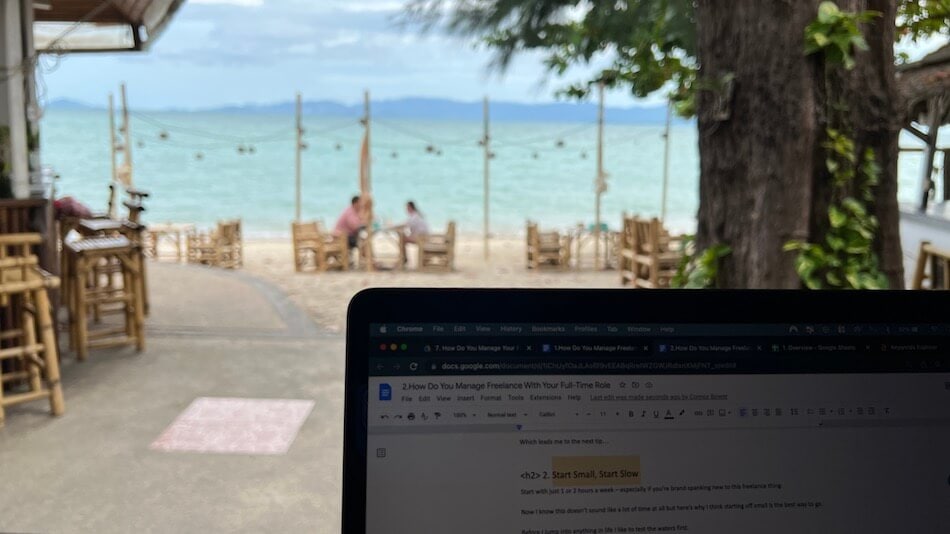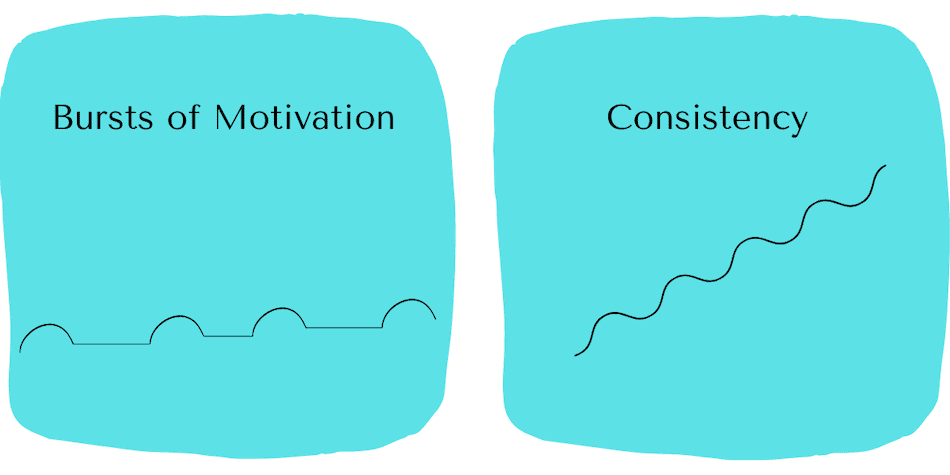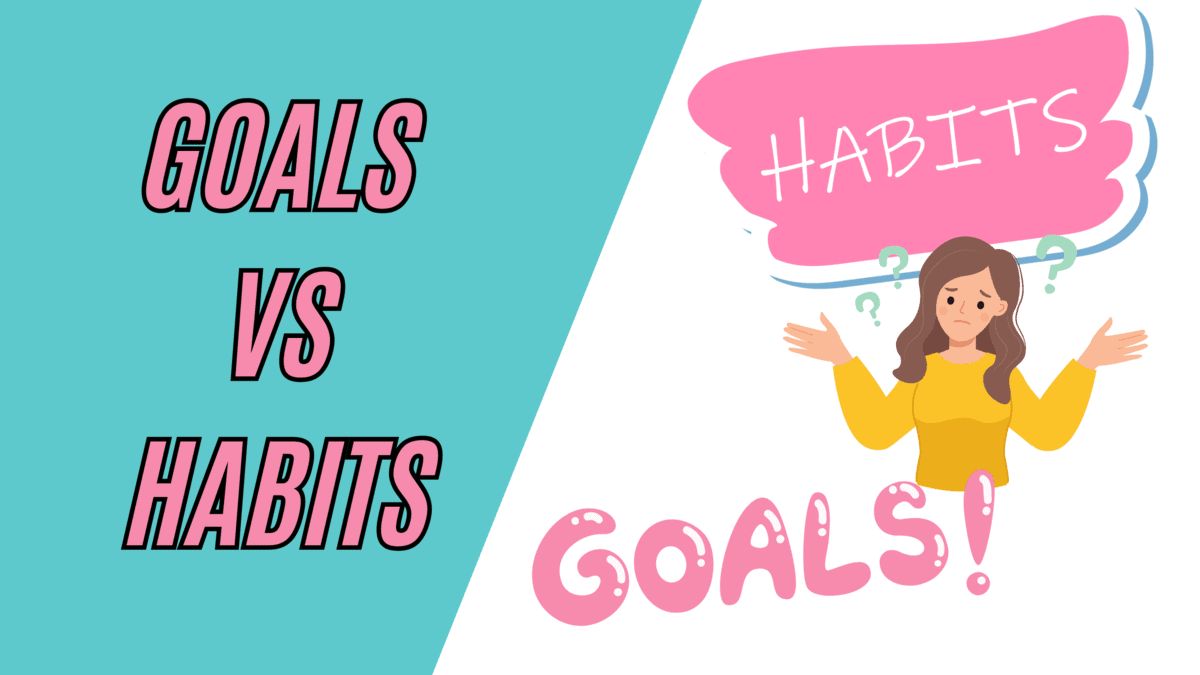Let’s not beat around the bush, ok?
Freelancing is hard…
Working a full-time job is hard…
Balancing work and freelance… That’s DOUBLE hard!
Seriously, we get it.
We started out freelancing just hoping for a little bit of extra cash every month, not sure if it would turn into anything more, and a few months later…
We were juggling multiple clients and working from home in full-time jobs during a global pandemic (good riddance covid-19, am I right?).
Some days we were thriving, so proud to have bagged some clients. And other days we felt overwhelmed, overworked, and ready to throw in the towel.
So, whether your goal is to replace your full-time income or you just want a little bit of extra cash, we’ve pulled together the tips and tricks that worked for us and helped us push through the hard days during the two years we were in your boat.
But remember: not everyone’s situation is the same – we don’t have kids for example. You might need to do things a little differently to find what works best for you.
Before we dive into the 10 tips on freelancing whilst working full-time, let’s talk a little bit about the benefits and drawbacks of starting your freelance career while you’re still in full-time employment:
Benefits
- Time: Starting your freelance business whilst holding down another job gives you the luxury of time to work on your freelancing skills, get better and gain experience over a longer period without the pressure to earn money right off the bat.
- Network: Build up a network of clients at a pace you feel comfortable with.
- Portfolio: When you start out you probably won’t even have one. Doing free work or creating a fictional portfolio to show off your skills shouldn’t be rushed.
- Backup: This was a big one for us. We had very few commitments in the grand scheme of things (rent, car, and food basically) but having a strong backup meant we guaranteed we could comfortably keep paying for these things while we built our business.
Drawbacks
- Available Hours (or lack of): Not being able to dedicate your full attention to your freelance business slows things down massively. If you’re building your business on the side, you need to be in it for the long game.
- Burnout: The risk that you’ll get burnout is high if you don’t manage things properly (speaking from experience after working countless 60-70 hour weeks before learning this)
- Sacrificing other things: Whether it’s after work drinks when the suns out on a Thursday or your lazy Sunday mornings. There are definitely ways to balance it all but when you’re short on time you have to make sacrifices.
Right, now we can get into our 10 best tips for managing your freelance and full-time roles.
1. Be Realistic With Your Time
When there’s money on the line it’s easy to start telling yourself that you can definitely manage a 40-hour week and throw in 20 hours a week for your freelance work.
(Not forgetting all that extra work time when your boss asks you to “just finish this one thing” at 4:55 pm)
Yes, you technically can work a few 60, 70, or even 80-hour weeks…
But it’s 100% not sustainable. It’ll make you feel like sh!t. So your work, health, and the people around you will be the ones to suffer when you’re running on pure caffeine.
That being said, you do have to be strict with yourself and set time aside for your new business – a sustainable amount of time.
Deciding how many hours you want to allocate to your freelance work massively depends on your circumstances:
- How many hours do you work in your full-time role?
- How often do you have to stay late?
- Do you have kids?
- Are you a carer for anyone else?
- Do you have pets?
For us, we were a pet-free, child-free household – no one relying on us to feed or walk them. But, our jobs often required us to stay late and even work on weekends, so we had to take that into account.
Don’t shoot for the stars when it comes to planning your time. Overcommitting will only leave you feeling dissatisfied and frustrated with yourself when you don’t follow through.
So, one last time, be realistic with how many hours you can commit to your new business.
Which leads me to the next tip…
2. Start Small, Start Slow
Start with just 1 or 2 hours a week – especially if you’re brand spanking new to this freelance thing.
Now I know this doesn’t sound like a lot of time at all but here’s why I think starting off small is the best way to go.
Before I jump into anything in life I like to test the waters first. For example, I started by writing a couple of blog posts on topics I liked to see if I could commit to actually finishing them…
and now here I am with a fully-fledged business, writing this blog from a cafe in Thailand.

Starting off with a couple hours a week gives you a really good sense of whether or not you’re going to enjoy it – before you’ve invested a huge amount of your time.
If you can’t even commit to that? Then you know it’s not for you.
If it’s not enough and you’re dying to do more? That’s a good sign. Go ahead and ramp it up to a level that’s comfortable.
3. Find Your Motivation

I’m not into all the woo-woo spiritual stuff (yes this is the technical term), but this is really about finding your “why”.
Finding your deeper motivation means thinking about what makes you want to get out of bed in the morning, and should be closely linked to your long-term annual goals.
For us, our motivation was our goal to quit our jobs, sell everything, and travel the world.
So what’s yours?
You can also check out our post on setting goals for a little extra help on finding your why.
4. Be Disciplined
Motivation is why you start. Discipline is what keeps you consistent and growing.

After a stressful day at work, it’s hard to get your laptop out and work on your freelance business when all you want is to curl up with a cup of tea.
After a long week at work, it’s hard to say no to spending your Saturday out with friends, visiting family, or binge-watching Netflix.
That’s when discipline comes into play to push through that temptation and just get the work done.
Finding tools and techniques for managing our time really helped us with this – so we could be as productive as possible with the hours we have available. So, if you haven’t already, take a look at our post on freelancer time management next.
Trust me when I say this (because I’ve been where you are right now) but being disciplined and consistent whilst you’re trying to manage a new business, find clients, meet deadlines, and keep up with your existing job is the winning formula.
To further streamline your workflow, consider creating a To-Don’t List to stay focused on what truly matters.
5. Don’t Forget About Your Personal Life
It can be easy to get fixated on your newfound passion for freelancing. So, it’s extremely important that you remember to give yourself personal time and not neglect your family and friends.
There’s a lot of stigma out there that taking any time off is bad and that the reason you aren’t where you want to be is because you watch a few episodes of Netflix every now and then.
This is the part of hustle culture that I personally don’t agree with – and I wrote a whole article on the toxic side of hustle culture if you’re interested in why.
Now I get it, when you’re trying to build yourself a better life by starting your freelance journey, you definitely feel guilty when you put aside time for personal stuff and a bit of me time.
But freelancing is supposed to bring you more money and freedom. So make sure you use it wisely and take some time off every once in a while.
6. Listen to your body
Following on from hustle culture, this is a tip I wish I took note of when I was working full-time and starting my freelancing business.
So many times I would wake up on a Saturday after working a full work week and freelance in the evenings, all I would want to do is sleep all day.
Too many times I would completely ignore what my body was trying to tell me and power on through – because I thought I was being disciplined.
But in reality, I just needed a break sometimes. And I paid for it by getting ill a lot because I was burnt out.
Know the difference between pushing yourself and pushing yourself over the edge. If your body is telling you that you truly need a break, take one.
7. Be Transparent With Your Clients
If you’re not working with clients then this section isn’t really applicable to you. But if, like us, your business depends on working with clients then it’s important to be transparent with them.
What do I mean by this?
Be clear about your availability. The last thing you want to do is give them false impressions that you do this full time and get caught out.
Let them know upfront that you’re only available to take calls between certain hours/on certain days.
Or that you won’t be responding to emails during certain hours because you are at work.
And finally, be clear and concise on your deliverables.
“I’ll have this ready next week” isn’t good enough.
The difference between Monday morning and Friday afternoon is light years apart when you are working with limited available hours.
8. Learn to Say No

Don’t over-commit by taking on too many clients or too many projects at once.
I know the thought of turning down work can be daunting. There are question running through your head like:
“How can I say no to this client when I might not get another for months”
“What if saying yes to this client turns into more consistent work, how can I pass up on this opportunity?”
“I don’t want to say no because it might look like i don’t actually know what i’m doing and they might not come to me for future work”
All these thoughts… I’ve had them.
But, here’s why saying no to clients is actually a good thing and how to actually go about saying no.
Saying no makes you desirable. Turning down work because you have too much work means other people are using your services.
So instead of straight up saying no, explain that you can’t commit to this work right now but you can get it done for “next month”, “in 2 months” or whenever you next have an available slot – chances are, they’ll be happy to wait.
Not to mention the situations you can get yourself into by over-committing. I remember spending countless nights up until 3am finishing a project when I had to be on work meetings at 7am the next day. Trust me, it’s not fun.
Note: If you’ve got a client who’s only focused on cost and timelines over quality…. 🚩🚩🚩
9. Consider Working With Clients From Different Time-Zones

I fell into working with clients from other time zones, but quickly realized it helped me so much.
It meant that I could arrange calls for 5 pm onwards UK time and it would still be the middle of the working day in the US.
Thinking back to the start of my freelance journey, I don’t think I could have scaled up so quickly by only taking on clients in the UK.
However, this again is something completely unique to you and your circumstances. You may work shifts which would mean you could take client calls at any time so long as it’s the days you are off.
Go ahead and check out this post on time-zone management for working with clients in other time zones.
IMPORTANT: Always speak to an accountant before working with a foreign client as it may have tax implications.
10. Separate Your Work, Freelance, and Personal Devices and Tools
This is critical.
It means you can focus on the task at hand without distractions and keep different aspects of your life separate.
Now I’m not saying to buy 2 laptops and 2 phones… that’s ridiculous.
However, I do have 2 accounts on my computer – one of them for all of my freelance work, which is signed into all of the accounts I need and more importantly not signed into any of my social media accounts.
Then the other is for personal activities and is signed into my personal email, Netflix, social media etc.
No Facebook notifications while you’re working. And no work emails popping up while you’re binging your favorite show.
Finally: Make Sure It’s Sustainable and Just Enjoy It
Even if you have the intention of replacing your full-time role with freelance work, you have to make sure you go about it in a sustainable way.
It’s no good jeopardizing your job or your well-being by putting too many hours into your freelance work. Especially if you’re in a situation where your job is your only source of income and you have dependents.
Chances are, if you’ve been putting more hours into your freelance work and your full-time work has slipped due to this, your freelance work has likely slipped too.
The absolute last thing anybody wants is to lose their job and their clients at the same time.
That’s why you should mold these tips to fit with your circumstances and find a balance that makes you fulfilled and happy with your new business.




